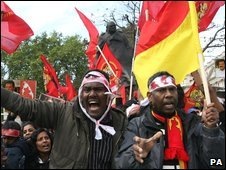 A 73-day protest involving thousands of people demonstrating over the plight of Tamils in Sri Lanka has ended.
A 73-day protest involving thousands of people demonstrating over the plight of Tamils in Sri Lanka has ended.
The protest featured hunger strikes, mass sit-ins that blocked central London roads and people throwing themselves into the River Thames.
Organisers said the demonstrations had made the British public aware of their "concerns and despair".
Protesters have at times clashed with police during the gatherings outside the Houses of Parliament.
Last month, a senior Met Police officer warned the long protest was diverting resources from other areas.
Commissioner Sir Paul Stephenson said if it continued it would have a "long term" impact on crime.
Police in London chose not to use force to clear the protesters, but maintained a 24-hour presence, with the cost of the operation exceeding £10m.
Participants had put up several tents in the centre of Parliament Square and at one point opened a curry takeaway.
The number of protesters varied over the 73 days from a handful to more than 15,000 as organisers called in support via text message and website posts.
About 100,000 demonstrators joined a march and rally organised by the British Tamil Forum in early April.
Surges in activity followed developments in Sri Lanka. In May government forces wiped out almost the entire senior Tamil Tiger leadership, ending the 26-year war between the army and the rebels.
The UN believes that nearly 7,000 civilians may have been killed and another 13,000 injured in the war since January. More than 250,000 people have been displaced from their homes in the north.
Suren Surendiran, of the British Tamil Forum, said further events, including another central London rally this Saturday, had been planned.
He said: "I am pleased with how the protest has gone. It was an opportunity to make the British public aware of our concerns and despair.
"Previously people thought of Sri Lanka as a holiday destination or a place for cricket. Now they are aware of some criminal activities, including state-sponsored terrorism.
"Whether people take sides or are aware of the details, I don’t know. But they are aware something is happening there."
Tamils ‘betrayed’
Ambi Seevaratnam, who was involved in talks between student organisers and police, said many people remained extremely angry about the fighting in Sri Lanka.
She said students had decided to continue to put pressure on politicians and the media.
"To achieve this it is not enough to stand in Parliament Square and scream," she said.
"After 73 days, nothing has worked. We feel the Tamils have been betrayed by the international community."
The Tamil Tiger rebels started fighting in the 1970s for a separate state for Tamils in Sri Lanka’s north and east. They argued that Tamils had been discriminated against by successive majority Sinhalese governments.
(For updates you can share with your friends, follow TNN on Facebook and Twitter )
